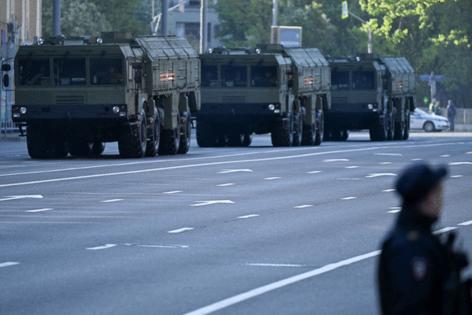Analysis: Why Putin is raising the specter of nuclear weapons again
Published in News & Features
WASHINGTON — Once again, Russian President Vladimir Putin is seemingly rattling the nuclear saber. But why now?
The Kremlin, citing recent comments by Western leaders regarding the war in Ukraine, said Monday that it would soon carry out simulated use of battlefield, or tactical, nuclear weapons — marking the first time Moscow announced such an exercise.
The announcement drew a sharp response. Defense Department spokesman Maj. Gen. Patrick Ryder called it "entirely inappropriate." NATO spokesperson Farah Dakhlallah termed Moscow's plans "dangerous and irresponsible," and the European Union called on Russia to "stop the escalation."
Like so many pronouncements from Moscow, this one's timing might matter as much as its substance.
This week holds two red-letter days for Putin: his inauguration on Tuesday to yet another presidential term after an unsurprising landslide election win in March, coupled with Thursday's traditionally bombastic Victory Day celebrations commemorating the Soviet victory over the Nazis.
It is commonplace for nuclear powers such as Russia — or the United States, for that matter — to conduct checks of their weapons stockpiles. But declaring an explicit connection between exercises involving practice use of nuclear weapons and comments by adversarial governments about an ongoing conflict is an unusual diplomatic move.
Russia's Defense Ministry said the planned tactical nuclear drills near Ukraine were intended to "unconditionally ensure the territorial integrity and sovereignty of the Russian state."
Tactical nuclear weapons, as the term implies, are far smaller and less powerful than strategic nuclear armaments such as intercontinental ballistic missiles carrying nuclear payloads that could lay waste to large population centers. But nuclear threats, even veiled ones, have a way of grabbing everyone's attention.
Unlike strategic nuclear weapons, battlefield nuclear munitions — which are relatively compact and easily transportable — are not subject to international arms agreements, and Russia's stockpiles are shrouded in secrecy. Such weapons can be deployed in the form of air-dropped bombs or short-range missiles.
The Pentagon closely monitors Russia's nuclear posture, and over the course of the Ukraine war, the Biden administration has reported no changes — even at times when Russian rhetoric suggests heightened tensions.
...continued
©2024 Los Angeles Times. Visit at latimes.com. Distributed by Tribune Content Agency, LLC.







Comments